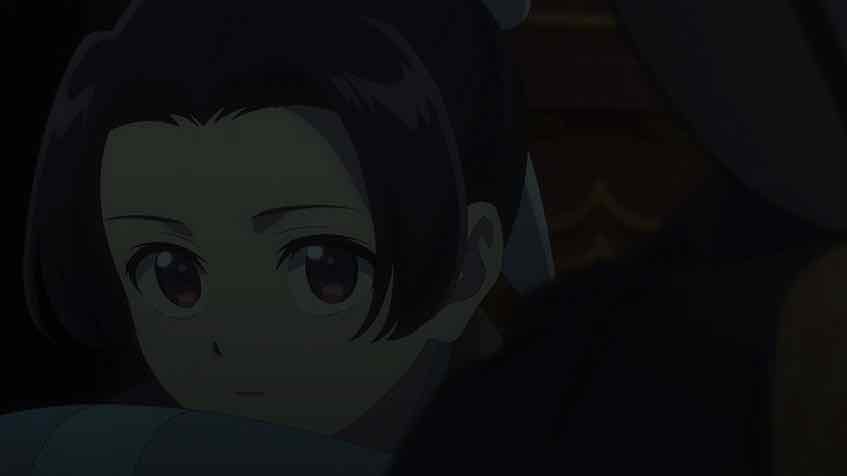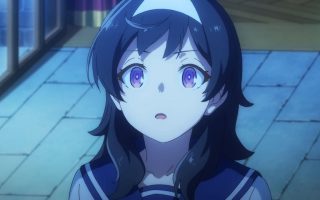I note it when The Apothecary Diaries annoys me (like when it overindulges in moeblobbing). But really, not many shows don’t have a bad habit or two. On balance this series is consistently, surprisingly excellent. There just isn’t much out there in the LN universe that can match it in terms of the sheer intellectual level of the writing. Or patience. I’m used to it succeeding a certain way, but the last couple of episodes have seen it excel in ways I’m not necessarily used to. And that’s certainly a hopeful sign for future developments (of which there are going to be a lot).
This ep isn’t going to be easy to write about, because it’s elegantly simple and pretty self-explanatory. But the hook here was an excellent one and really clever, far above the usual level for Kusuriya no Hitorigoto puzzles. We keep hearing about the people who used to inhabit this land (not coincidentally I’m sure). This time around it’s a massive shrine building that’s adjacent to Jinshi’s new girls’ school. Maomao (happy National Cat Day), in the act of spying on a class, takes quite an interest in it. Enough so that it catches the attention of the teacher (Yasuhara Yoshito, the original Aoshi from Rurouni Kenshin).
As it turns out the old eunuch is also the one in charge of that old building, the “Shrine of Choosing“. He also knew Loumen, and notes that he too took an interest in it when he was in the Rear Palace. No one pays much attention to it these days but once upon a time, all rulers of the land had to pass through its maze successfully. This is all tied into the legend of the “Mother Royal“, whose eyes could see in darkness and was the outsider who came to the land and the matriarch of its new dynasty. Xiaomao knows this because it’s what the old man was lecturing on (coincidence is never far from the surface in Kusuriya).
One might quibble with a couple elements here, and they’re familiar quibbles. As far as we know color blindness wasn’t documented anywhere until 1794 (in England), and in China until well into the 19th Century. The setting here is a fictional mix of anachronistic elements but certainly earlier than that. Also the bit about color blind people having better night vision is apocryphal. But who cares, really, as this is a very clever conceit and really well played. I didn’t spot the trick immediately – neither did the Emperor when he went through the maze of doors, accompanied by Maomao and Jinshi. But when she figured it out, it was such an aha moment that I actually shouted “Aha!”.
There are a lot of interesting subsidiary elements to this. Can Jinshi see (or not see) what his brother cannot (or can)? The Emperor gets maybe the longest run he’s had so far. And he comes off as a pretty thoughtful and measured guy. Taking Jinshi and Maomao with him as he tried the maze was a fascinating move – as was the fact that he had already tried several times even though the ritual holds no official meaning and is largely forgotten. He’s also quite capable of making jokes, not least at his own expense but certainly Maomao’s (the breast size thing was kind of both). And he very pointedly dismisses the old man’s notion of taking Xiaomao as a concubine on the grounds that it would upset Lakan.
It’s obviously also important that we know more about Jinshi than ever – and that he knows, too. We see him as a child (played by Han Megumi) – I’d assumed the boy from the OP was him, but now it’s confirmed – via flashback (dream). And it confirms not only that Jinshi is the current emperor’s brother, but that he himself is aware of it. The first always seemed overwhelmingly likely, but the second was much more uncertain. The relationship (practical, not biological) between the Emperor and Jinshi is a crucial variable we still don’t fully grasp. But the hard reality is that Jinshi’s very existence represents a threat to the status quo in this sort of society.
The other element that’s implicitly confirmed here is that Maomao has a willful blind spot where Jinshi is concerned. That’s been the vibe for a good while but Jinshi explicitly says he believes it here (and that he wishes she knew, as it would be less stressful for him). Why is this? She’s obviously the smartest person in the room no matter what the room is (unless Lakan or Loumen are in it too, in which case it’s game on). She may give us the answer herself – “some things are best left unknown”. Xiaomao is certainly smart enough to suspect the truth, but also to grasp that it’s a potentially dangerous one. In the end, though, people like her can only maintain that sort of self-deception for so long.
The post Kusuriya no Hitorigoto (The Apothecary Diaries) – 31 appeared first on Lost in Anime.




